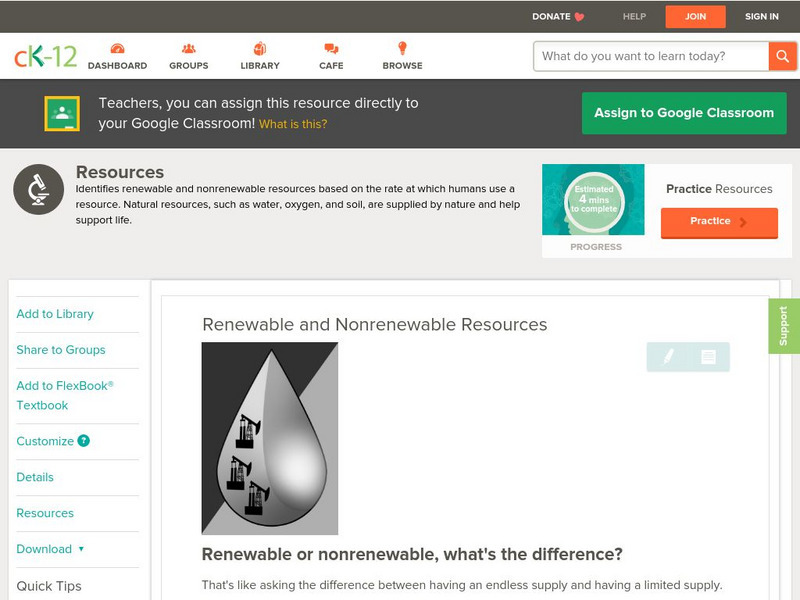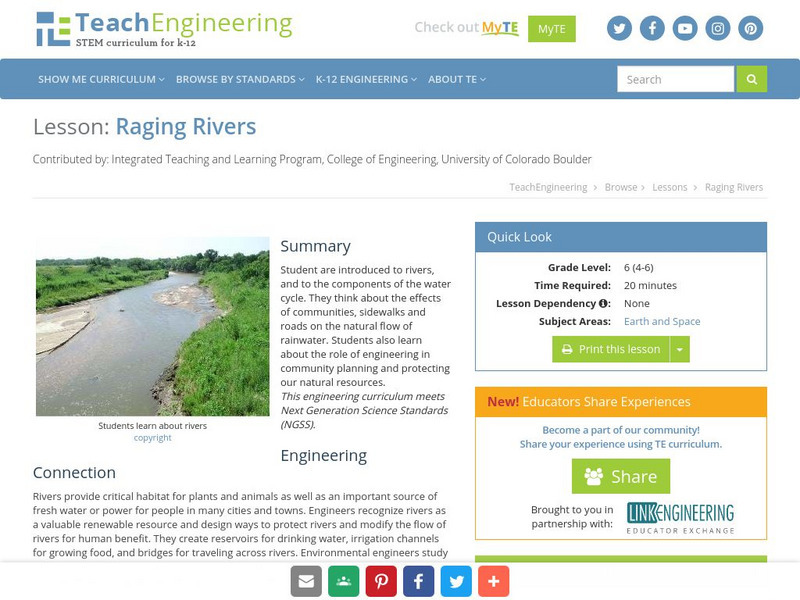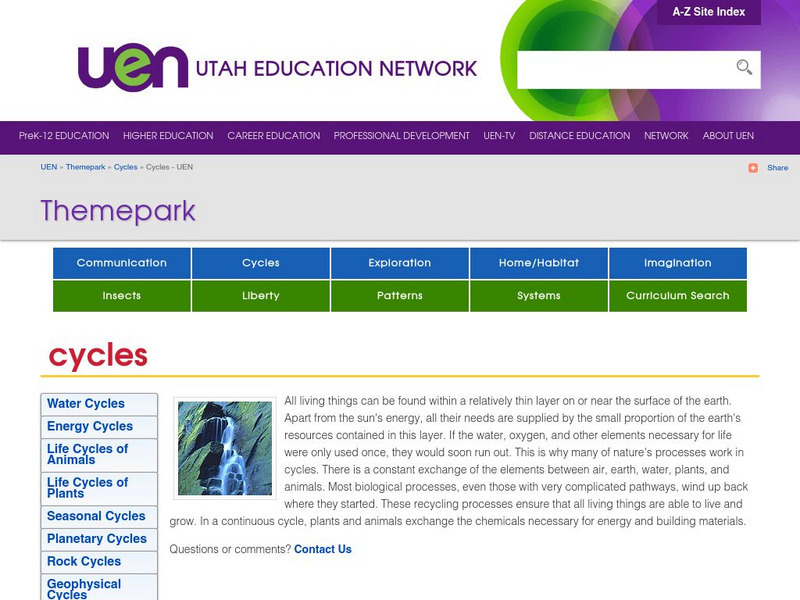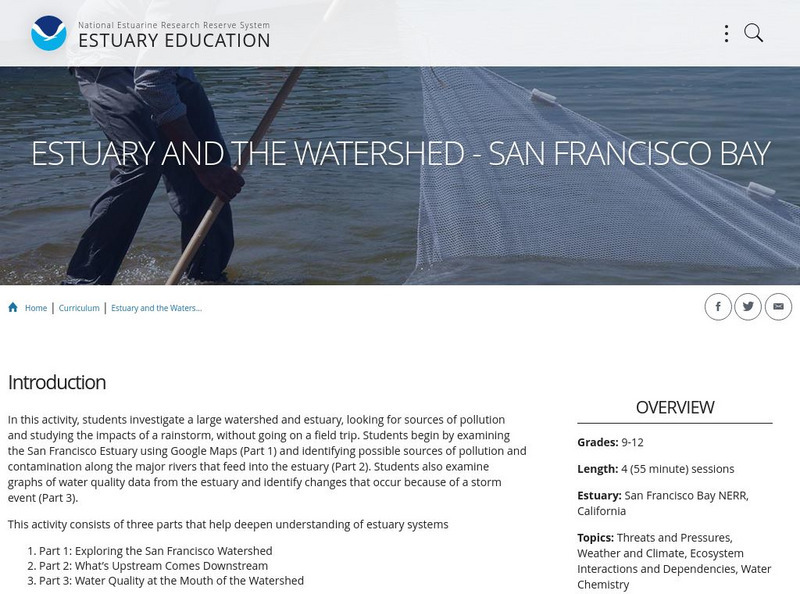CK-12 Foundation
Ck 12: Biology: Natural Resources Study Guide
Understand what natural resources are, and how important they are to Earth.
CK-12 Foundation
Ck 12: Biology: Renewable and Nonrenewable Resources
[Free Registration/Login may be required to access all resource tools.] Identifies renewable and nonrenewable resources based on the rate at which humans use a resource. Natural resources, such as water, oxygen, and soil, are supplied by...
American Geosciences Institute
American Geosciences Institute: Why Is Water Special?
An introduction to one of the most diverse natural resources on Earth, water.
CK-12 Foundation
Ck 12: Earth Science: Uses of Water Study Guide
[Free Registration/Login may be required to access all resource tools.] This study guide summarizes the key points about the uses of water. Includes a few questions to check for understanding.
Alabama Learning Exchange
Alex: Water You Doing to Help?
In this lesson from "The Friends of Auntie Litter", (www.auntielitter.org), bodies of water in the Gulf Coast will be explored. Students will also simulate an oil spill. This lesson is one from the "Take Pride Statewide" series. *This...
Other
Nc Department of Energy and Natural Resources: River Basin Riddler Cards
Cut out the fact cards to make a river basin trivia game. Assign points to each of the facts and hold a class competition. Can also be downloaded from here as a PDF file that includes score cards.
TeachEngineering
Teach Engineering: Rolling Blackouts & Environmental Impact
The goal is for the students to understand the environmental design considerations required when generating electricity. The electric power that we use every day at home and work is generated by a variety of power plants. Power plants...
PBS
Nh Pbs: Nature Works: Estuaries
Learn more about estuaries when you visit this informative site. This resource provides locations of and weblinks to estuaries in the United States.
Council for Economic Education
Econ Ed Link: There Is Something in the Water
The United States is losing 60,000 acres of wetlands each year. Is this good or bad? Does anyone really want to live in swamps, fens, bogs, and marshes? Or is it better economics to drain the wetlands for other purposes like agricultural...
TeachEngineering
Teach Engineering: Raging Rivers
The lesson plan introduces students to the steps of the water cycle and rivers. They think about the effects of communities, sidewalks and roads on the natural flow of rainwater. Students also learn about the role of engineering in...
PBS
Pbs Nature: Penguins
Did you know that penguins can survive for more than 100 days without food or water? Discover more educational facts about these fascinating birds when you explore this site.
Science Buddies
Science Buddies: Swimming in Acid: Understanding Ocean Acidification
The oceans are a precious natural resource, part of Earth's carbon cycle. But what happens if the oceans absorb too much carbon dioxide? Many scientists are concerned that the increased absorption of carbon dioxide is causing them to...
PBS
Nh Pbs: Nature Works: Rivers and Streams
Learn more about Rivers and Streams through this educational resource. This site features photographs, a description, fun facts, and more about this type of freshwater ecosystem.
The Wonder of Science
The Wonder of Science: K Ess3 3: Environmental Solutions
This NSTA vetted source includes resources to teach ideas on reducing the impact of humans on the environment. Included are assessment ideas, videos, examples, lesson plans, and photos of student work.
PBS
Pbs Nature: Sharks
How many species of sharks are there in the world of water? Students will discover how and where sharks live, what they eat and how they socialize through the exploration of this resource.
American Geosciences Institute
American Geosciences Institute: Earth Science Week: Properties of Fluids in Reservoirs
This investigation will help students understand the physical relationships between natural gas, oil, and water in a reservoir and how these relationships can affect recovery.
American Geosciences Institute
American Geosciences Institute: Careers: Hydrologist
Fins out what it takes to become a hydrologist, and to work with our most fundamental resource, water.
Utah Education Network
Uen: Themepark: Cycles
This is a large collection of resources on cycles of nature and the Earth. There is a constant exchange of the elements between air, earth, water, plants, and animals. Most biological processes wind up back where they started. These...
NOAA
Noaa: Estuaries 101 Curriculum: Survival in an Estuary
This activity introduces students to the nature of estuaries, estuarine environmental factors, and four important abiotic factors-pH, temperature, dissolved oxygen, and salinity-and how they vary in estuaries. A PowerPoint presentation,...
NOAA
Noaa: Estuaries 101 Curriculum: Estuary and the Watershed San Francisco Bay
In this activity, students investigate a large watershed, look for sources of pollution in the watershed, and study the impacts of a rain storm on a watershed and estuary, without going on a field trip. Students investigate the nature of...
Travel Document Systems
Tds: Lesotho: Economy
Read about the interesting economy of Lesotho which is based on water as its greatest natural resource. You can also find out about the other exports, its infrastructure, and currency. Information is from the U.S. State Dept. Background...
State Library of North Carolina
N Cpedia: Lake Mattamuskeet
Lake Mattamuskeet-so named by Algonquian Indians-is North Carolina's largest natural lake. The ancient body of water has not escaped man's intervention. Originally, Mattamuskeet was a shallow, self-contained lake without creeks or rivers...
Travel Document Systems
Tds: Latvia: Geography
Latvia, a country on the Baltic Sea, has thousands of rivers. Find out about these and other bodies of water. You can also read about the climate, natural resources, and terrain. From the CIA World Fact Book.




















